Bass Players To Know: Wilbur Bascomb, Jr.
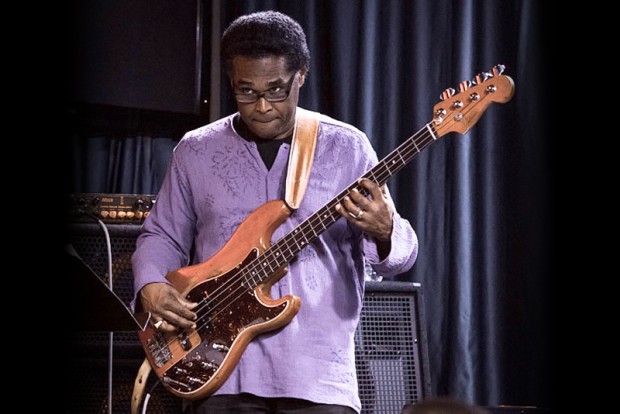
“Come Dancing”, “Play With Me”, “Led Boots”… these were some of the funkiest songs I had ever heard! It was 2005 and a bass player friend had just turned me on to Jeff Beck’s Wired. The groovy keyboard parts, punchy bass lines, and space-age sounds of Beck hooked me like a fish. It was a magical time; strolling down the streets of New York, grooving so hard that I almost forgot to look both ways before crossing the street. It would be almost a decade before I took the time to explore the career of the bassist on that record, but hey, better late than never. With an in-your-face bass tone and a resume that includes some of the who’s who of funk and blues, Wilbur Bascomb, Jr. is the latest bass player to know.
So Who Is Wilbur Bascomb, Jr.?
Hailing from Washington Heights, New York, Wilbur is the son of trumpeter Wilbur Bascomb, Sr. (Erskine Hawkins Orchestra and Duke Ellington). Exposed to music at a young age, he took to the bass guitar and matured as a player in New York City. His career began to blossom in the early 1970s, marked by performing with James Brown and recording Reality in 1974. He then joined Jeff Beck for 1976’s Wired, adding an exceptional amount of groove and flair to the guitar virtuoso’s outfit. Bascomb also released a solo effort, Wilbur Bascomb and Future Dreams, in 1977.
Over the next decade, Bascomb racked up touring and recording credits with B.B. King, Hank Crawford, George Benson, Bo Diddley, Mick Taylor, The Players Association, and many others. He frequently found himself grooving alongside drummer Bernard Purdie, working as a tight knit and undeniably funky rhythm section. Bascomb continued to have an active recording career through the 1990s.
Let’s Talk Style
1976 was a landmark year in the world of bass. No longer stationed in the back, bass players began taking the spotlight as super-charged band members and solo artists. Stanley Clarke’s School Days, Jaco Pastorius’ self-titled record, and Bootsy Collins’ Stretchin’ Out in Bootsy’s Rubber Band redefined the role and tone of the instrument. Bascomb Jr. was in good company as he joined Jeff Beck for Wired, stretching out with many of the new techniques of his contemporaries.
On this record and many others, he establishes the main theme of the song with a tight and aggressively played groove. His timing is definitive, the punchy attacks and short note durations clearly dictating the feel and creating momentary gaps for the snap of a snare. Quick chromatic triplets, descending string rakes, and hammer ons pay homage to the rhythmic complexity established on earlier Motown records yet continue to push the envelope. He provides a wake up call to those who hadn’t focused on the bass before, integrating slap and pop techniques, chords, harmonics, and slinky string bends.
While his solo projects and Wired take advantage of the electric bass’s “coming out,” his work as a sideman with other artists reveals his versatility and refinement. Still armed with the bright and iconic tone of the 1970’s, he plays to the elegance of the slow blues, the delightfully repetitive drive of a rock song, and the cleverly syncopated funk grooves.
Where Can I Hear Him?
“Head For Backstage Pass” (Jeff Beck: Wired)
 While every bass line on this record deserves to be dissected, this particular song is not only written by Bascomb, but features a bass solo at the top of the tune. Grabbing your attention with forceful slap-and-pops, quick harmonics, and bended notes, he makes a statement before ushering in the band. They all participate in the main theme, a syncopated line with classic 70’s funk moves. The groove plays with the space in an octave—he hits the high note, instantly drops down, and uses the space in the middle to play an double-stop ascending line. His exploration of range, execution of difficult riffs, and playful interjections provide the backdrop for solos and musical dialogue.
While every bass line on this record deserves to be dissected, this particular song is not only written by Bascomb, but features a bass solo at the top of the tune. Grabbing your attention with forceful slap-and-pops, quick harmonics, and bended notes, he makes a statement before ushering in the band. They all participate in the main theme, a syncopated line with classic 70’s funk moves. The groove plays with the space in an octave—he hits the high note, instantly drops down, and uses the space in the middle to play an double-stop ascending line. His exploration of range, execution of difficult riffs, and playful interjections provide the backdrop for solos and musical dialogue.
Listen: iTunes | Amazon MP3
“Life Ain’t Nothing But A Party” (B.B. King: There Must Be A Better World Somewhere)
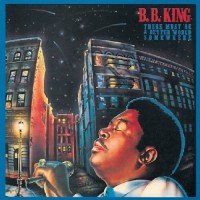 Unlike the subdued and “upright” approach to earlier blues recordings, Bascomb brightens up this B.B. King record with his signature attitude and tone. Playing alongside Bernard Purdie and Dr. John, the rhythm section makes even the slower, more heartfelt songs significantly more funky. On this particular tune, Bascomb’s bass line follows the chord changes with appropriate voice leading movement and doubles as the groundwork for the horn arrangement in the second verse. His timing is impeccable, clearly dictating how the song grooves and providing the perfect foundation for the solo/vamp out.
Unlike the subdued and “upright” approach to earlier blues recordings, Bascomb brightens up this B.B. King record with his signature attitude and tone. Playing alongside Bernard Purdie and Dr. John, the rhythm section makes even the slower, more heartfelt songs significantly more funky. On this particular tune, Bascomb’s bass line follows the chord changes with appropriate voice leading movement and doubles as the groundwork for the horn arrangement in the second verse. His timing is impeccable, clearly dictating how the song grooves and providing the perfect foundation for the solo/vamp out.
Listen: iTunes | Amazon MP3
“Chariots of the Gods” (Wilbur Bascomb: And Future Dreams)
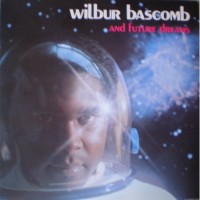 Reminiscent of earlier Stevie Wonder records, the song is set up by a syncopated drum groove, with the keyboards and choir introducing the main theme. It then gives way to Bascomb’s simple, quarter-note bass line that drives the song. Halfway through, Bascomb steps out as the band falls away. His solo revolves around a specific theme, embellished by quick technical moves, a slinky high chord, and a final low note to conclude the section and signal the return of the main theme.
Reminiscent of earlier Stevie Wonder records, the song is set up by a syncopated drum groove, with the keyboards and choir introducing the main theme. It then gives way to Bascomb’s simple, quarter-note bass line that drives the song. Halfway through, Bascomb steps out as the band falls away. His solo revolves around a specific theme, embellished by quick technical moves, a slinky high chord, and a final low note to conclude the section and signal the return of the main theme.
How about you? What’s your favorite tune or album with Wilbur Bascomb, Jr.? Please share with us in the comments.
Ryan Madora is a professional bass player, author, and educator living in Nashville, TN. In addition to touring and session work, she teaches private lessons and masterclasses to students of all levels. Visit her website to learn more!

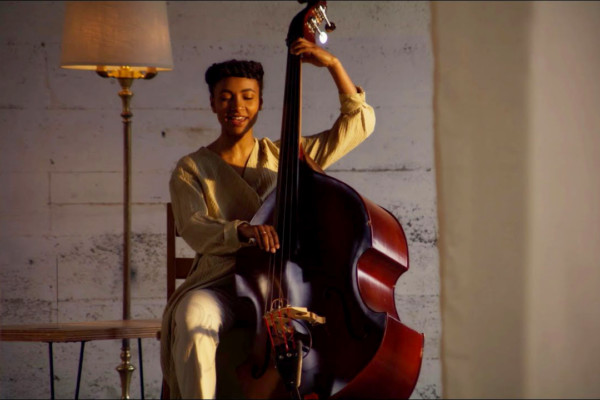
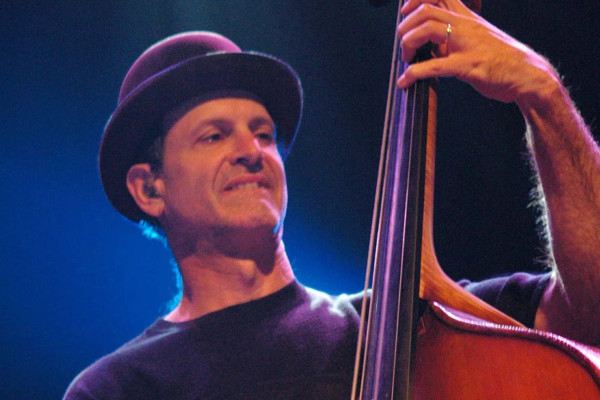
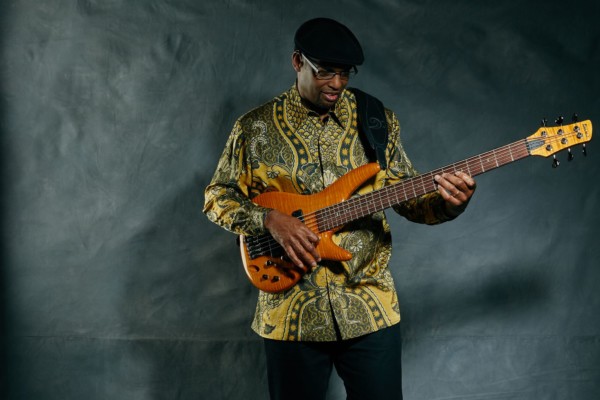
Wasn’t familiar with Wilbur Bascomb. Thanks for the heads up! Off to YouTube to listen!
Man, the stuff he did on the Jeff Beck album is killer. Very cool – thanks!
The Hair Movie OST
Check Wilbur out on Bo Diddley’s 1974 LP “Big Bad Bo”, funk, slow blues (van morrison’s “I’ve Been Working”) & rockers, his tone and timing are impeccable.
One of my all-time favorite bass lines is from the cover of “Mean Mr. Mustard” on the soundtrack to the 1978 movie “Sgt. Pepper’s Lonely Hearts Club Band” (starring Peter Frampton and Bee Gees). I NEED to know — is the bass player on this track Bascomb or David Hungate? Anybody know?
Monster bassist!! Check out “king of the funky people” from his solo album. Fantastic jam with a nasty guitar
solo from the late great Hiram Bullock. Also Idris Muhammad’s “turn this mutha out” is another album that
Wilbur really shines.
Every Bass player should listen at least ten times to the Hair OST. It should be known as one of the best bass recording of twentieth century. No doubt!
Did he played “aquarius” from Hair
Bascomb played on the Hair movie soundtrack along with Bernard Purdie. And both of them played on the Sgt.Peppers movie soundtrack. His sound and style is very recognizable. Outstanding bass player.
Wilbur is a great bassist, great musician, knows the lyrics and sources of every tune. I was lucky to meet him in an ensemble class. He told a wonderful story about playing a concert, I think at the Apollo. He said that while he was playing he heard a gravely voice from behind him, a voice that could only be (and was) Miles. Miles said “your name is Bascomb?” “yes” “your father was the trumpet player?” Yes” …pause and Miles says “Your Dad could play”…and another long pause listening and then “You can play”. I never heard his Dad, but Wilbur is a monster on electric AND on standup. And a wonderful person.